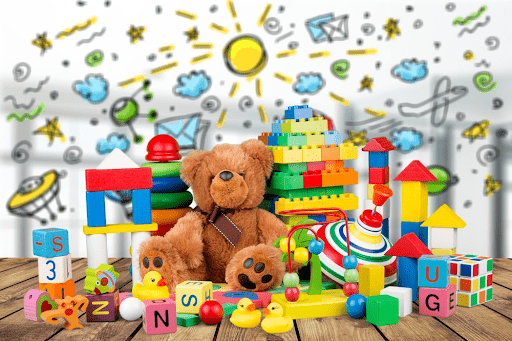Choosing the suitable toy for your child is an important decision that often involves balancing what your child wants, their age and safety, and finding something within budget. To help parents make informed decisions on toys suitable for their kids, we outline seven factors to consider when selecting the perfect toy. Whether it’s dolls or balls. Whether you’re buying with durability in mind or just trying to find something fun and age-appropriate – this guide will provide parents with essential guidance to ensure they are making safe choices while ensuring that children have access to toys that suit them best.
Age appropriateness: Choose appropriate toys for the child’s age and developmental stage.
It is essential to consider age appropriateness when selecting toys for kids and younger children. When toys are developmentally appropriate, they encourage and facilitate healthy physical, mental and social growth. Toys that are too advanced for a child’s skills can be discouraging and inhibit learning, as the kids love or child may feel overwhelmed or unsuccessful in their attempts to play with complex items.
Equally, more than simple toys are needed to challenge the brain or motivate the child for meaningful playtime. Toy selection should reflect the order in which their milestones of growth will be achieved, including cognitive, fine motor and gross motor skills – offering each the opportunity to develop at an appropriate pace so that new achievements will be not only easily accessible but also pleasurable experiences.
Choosing toys for kids that are age appropriate is vital to their overall development and growth. Toys unsuited to the child’s age can distract from significant learning opportunities and even cause harm due to parts being too small for them to manage safely. Age-appropriate toys help children foster problem-solving, hand-eye coordination, creativity, and cognitive learning. For example, a baby may enjoy grasping a cloth toy with different textures, whereas an older child could benefit from puzzles they will have to figure out.
Parents must select toys specifically designed for the level of maturity their child has achieved. Purchasing suitable toys is one of the best ways parents can support their child’s development as they grow up.
Safety: Make sure the toy meets safety standards and does not contain any harmful materials.
Safety should top your list when purchasing toys for your little ones. Poorly made, dangerous toys can harm children’s health and well-being. When choosing a toy, ensure it meets the safety standards outlined by the Consumer Product Safety Commission.
Consider that the toy is not made with lead paint or other unsafe material; these materials can cause serious harm if a child ingests them. Poorly designed toys can also present a risk of injury to an unsuspecting little one, like loose magnets and avoid marbles. Take the extra time to carefully examine toys before giving them as a gift so you won’t regret it later on due to an unforeseen issue with safety.
When choosing toys for young children, always prioritize safety. Small parts can pose a choking hazard, while sharp edges can cause cuts. Avoid toys with long cords, as these can get wrapped around a child’s neck. Be sure to select age-appropriate toys; too-advanced toys may frustrate a child and lead to dangerous behaviours. Ultimately, the best way to ensure a toy is safe is to choose one certified by a reputable organization, such as the US Consumer Product Safety Commission.
Interests: Consider the child’s interests and choose toys that engage and inspire them.
When shopping for the best toys for children, especially toddlers, it is essential to keep their ages and interests in mind. Toys that challenge and stimulate the child’s mental, multi-sensory experience and physical development should be chosen. This helps to engage their curiosity and encourages them to think creatively.
It is also beneficial to look for toys that will inspire your little one’s imagination, as these can help provide hours of fun and exciting open-ended playtime. Not only will toys chosen with the child’s interests in mind create an enjoyable experience, but they can also foster an appreciation of learning in a safe and informal setting.
For children of all ages, Djeco Toys are an excellent choice that encourages creative play and harnesses the power of creative learning while allowing children to explore their interests. Djeco Toys foster critical skills in children, such as problem-solving and social interaction, aiding mental and physical activity development.
The vast selection Djeco has to offer means parents can customize which toys best suit their child’s specific needs. Some Djeco toys focus on developing scientific skills and reasoning; others are great for helping them understand how to interact with one another in an engaging and stimulating manner. It is essential to consider a child’s preferences when choosing toys from Djeco; this way, you can ensure your son or daughter will have hours of entertainment and, at the same time, explore topics that may spark their interest, such as astronomy or fairy tales.
Skill development: Look for toys that can help develop the child’s skills, such as hand-eye coordination, problem-solving, and creativity.
Buying toys for children is an essential consideration as it can often influence their development. Toys provide children with a great way to stimulate learning and growth while they play, so it is important to find toys that are age-appropriate, safe and help develop critical skills. It is beneficial to look for toys that can help the child improve hand-eye coordination, problem-solving, creativity and other crafts. For example, puzzles and building blocks are great tools that help kids learn various concepts such as shapes, colours and spatial thinking. By selecting toys that offer simple but powerful learning opportunities, parents can ensure their child is getting the best out of each toy.
When buying the best toys for young children, it is essential to consider the fun factor and the skill development opportunities offered. Toys are a great way to help children learn as they play, and if selected correctly, can help them develop a range of skills such as cognitive, physical, emotional and social aptitude. Parents and carers should look into what kind of play the toy encourages and if it can aid the child’s learning growth in any significant way.
Developing these skills with play is much more rewarding than pure memorization or regular lessons; children are more likely to engage in activities more positively when it allows them to express their creative side. Toys that offer this balance between fun and educational value should be prioritized as part of your purchases -not only because it can influence their development but also because it encourages continued involvement for young minds.
Durability: Choose toys that are made to last and withstand play’s wear and tear.
When selecting toys, it is crucial to consider the product’s durability. As children often play vigorously and explore freely, buying toys that can stand up to wear and tear helps ensure your child gets the most out of them.
Additionally, considering a toy’s durability can help you save money in the long run, as cheaper items may break quickly and require frequent replacement. To ensure you get a quality item that will last for some time, check whether the manufacturer stands behind their product with a solid warranty. Doing your research ahead of time allows you to confidently pick a toy that captures the child’s imagination and is designed with longevity in mind.
When selecting toys for children, it is crucial to consider the product’s durability. Toys need to be safe and able to withstand the rough-and-tumble play they are likely to endure. The combination of up-to-date safety features and good-quality construction can ensure that children remain protected while enjoying their playtime.
By choosing durable toys, parents can have peace of mind knowing that their children are being kept safe with age-appropriate toys made of materials designed to last longer and without toxic materials. Taking the durability of a toy into consideration when making purchase decisions is a smart way for parents to ensure their child’s safety and provide them with hours of entertainment with dependable products.
Open-ended play: Opt for toys that encourage open-ended play and imagination rather than those with a specific outcome or goal.
When you buy toys for your child, consider how it will promote open-ended play. Open-ended play is essential in developing creativity, problem-solving and social interaction. Toys that foster this type of play allow children to use their imaginations to create stories and scenarios with no specific outcome or goal.
This lets them develop a sense of discovery as they explore different possibilities with the same toys. Additionally, because open-ended toys don’t dictate a result or drive most kids to focus on a specific activity or task, they can be played with over time – creating long-lasting value beyond just the initial fun moments.
Open-ended play is an essential factor to consider when selecting a toy. It encourages independent exploration, imagination, and problem-solving skills necessary for development. These meaningful activities require children and older kids to experience important learning milestones that they would otherwise achieve through open-ended play.
In addition, toys that are non-structured and flexible in use allow more varying possibilities in playtime activities; they can be used repeatedly, allowing children to explore the same things in different ways without losing interest as quickly as if playing with single-purpose toys. Therefore, when picking a toy for your child, it is essential to evaluate its ability to inspire creative thinking instead of only relying on how flashy or preferred it looks or seems compared to others.
Education value: Consider toys that can educate and enhance learning, such as educational games and puzzles.
While shopping for different kinds of perfect toys, it is wise to consider their educational value. Toys that can help to teach, encourage growth, and stimulate learning should be given top priority. Educational games, puzzles and other toys with engaging activities can help instil a passion for knowledge in toddlers and preschoolers.
They promote problem-solving and essential learning skills such as reading and mathematics. Stimulating toys also promote creativity which helps inspire young minds to venture out of the box with their innovative ideas. Choosing a toy wisely will provide your child with an enjoyable experience and an informative education that may benefit them throughout their lives.
Education values are a crucial factor to consider when selecting toys for children. Toys can contain invaluable learning opportunities to foster healthy physical and socio-emotional development. Academic concepts like teaching patterns, sequence understanding, colour recognition, counting and number recognition can be incorporated into high-quality toys to provide young learners with tools for lifelong learning.
Educational toys encourage problem-solving, language development, and cognitive skills that benefit kids as they grow. Choosing toys that foster creativity and imagination are also essential for helping children make sense of the world around them. Investing in age-appropriate educational toys is a crucial way parents can create a meaningful learning environment for their children now and in the future.
When you next go out shopping for toys for the kids in your life, consider these factors to ensure they will get something developmentally appropriate and engaging. If you have questions about toy selection, don’t hesitate to ask us below – we’re always happy to help!




